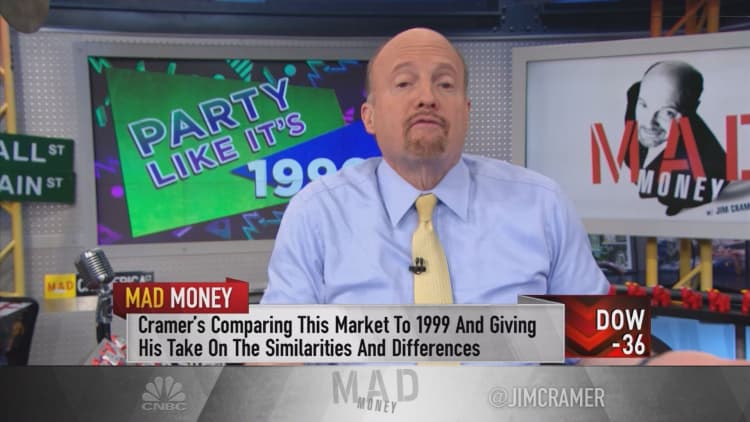
Jim Cramer hears worries every day that stocks are now overvalued, but still maintains that stocks aren't as outrageously priced versus other rallies in the past.
"The valuations are pretty darned reasonable, but I have a hard time proving it to people because we are in an incredibly visceral, polarizing moment stemming from the election of a pro-business president who seems to rack up an incredible amount of baggage on a daily basis," the "Mad Money" host said.
To prove that stocks are not overvalued once and for all, Cramer compared the top companies that dominated the market back in 1999, when the market was last on the verge of collapsing due to true overvaluation.
Overvaluation is a different scenario than an economic collapse, such as the Great Recession. That is why Cramer chose to look at the 1999 bear market, because it was the last time stocks collapsed under their own weight due to overrun fundamentals.
The five biggest stocks at the end of 1999 were Microsoft valued at $600 billion, General Electric at $507 billion, Cisco Systems at $355 billion, Wal-Mart at $307 billion and Intel at $275 billion.
The current five largest companies are Apple at $689 billion, Alphabet at $565 billion, Microsoft at $490 billion, Berkshire Hathaway at $400 billion and Amazon at $388 billion. Cramer also looked at Facebook's $387 billion, since it's only one billion less than Amazon.
Back in 1999, Microsoft and Intel sold at 65 times earnings, and 35 times earnings. The assumption was that the internet would take over the world and these companies had the software and hardware to make it happen. Unfortunately, the earnings explosion that investors expected never happened.
Cisco's earnings pretty much collapsed soon after its business was crushed by telco carriers that raised money in the stock market to build out their networks. Wal-Mart was supposed to be the fastest growing retailer, too. Unfortunately, the company over-expanded and the model didn't scale overseas like it was supposed to and Wal-Mart hit a wall.
"You could argue that all of these companies were overvalued on past earnings and they turned out to be even more overvalued on future earnings," Cramer said.
Looking at today's top companies, Apple sells at just 14 times earnings with a rapidly growing service revenue stream. Alphabet sells at about 21 times next year's earnings with $52 billion in cash overseas and has a 16 percent growth rate. Facebook sells at 22 times next year's earnings with 52 percent revenue growth and has $29 billion in cash.
Warren Buffett's Berkshire Hathaway sells for 20 times earnings. The only outlier was Amazon, trading at 110 times earnings. But Amazon has always been an outlier, Cramer said. Given how it has crushed Wal-Mart and threatened the entire brick-and-mortar business with extinction, Cramer thinks it is merely taking the market capitalization away from the businesses it destroys and said the market cap is justified.
"The question to ask isn't how did this current group of behemoths get so expensive. It's how did they get so cheap," Cramer said.
With only one of the six largest companies not bound by conventional metrics, Trump or no Trump, the valuations seemed completely rational to Cramer.
Questions for Cramer?
Call Cramer: 1-800-743-CNBC
Want to take a deep dive into Cramer's world? Hit him up!
Mad Money Twitter - Jim Cramer Twitter - Facebook - Instagram - Vine
Questions, comments, suggestions for the "Mad Money" website? madcap@cnbc.com



